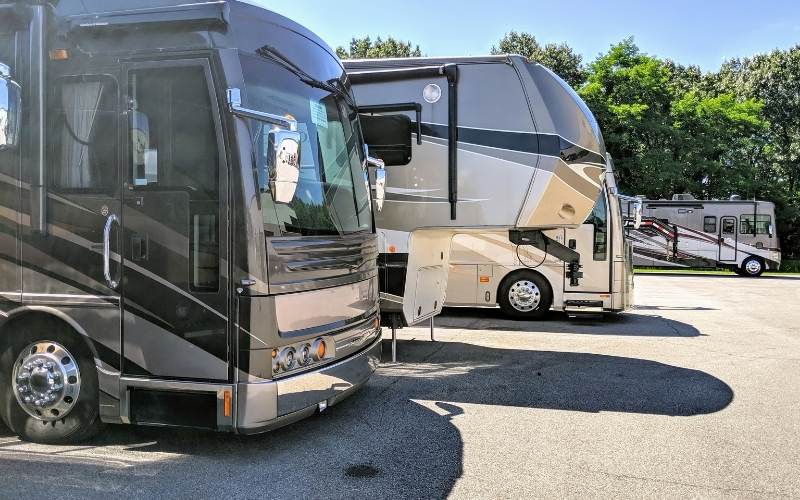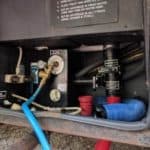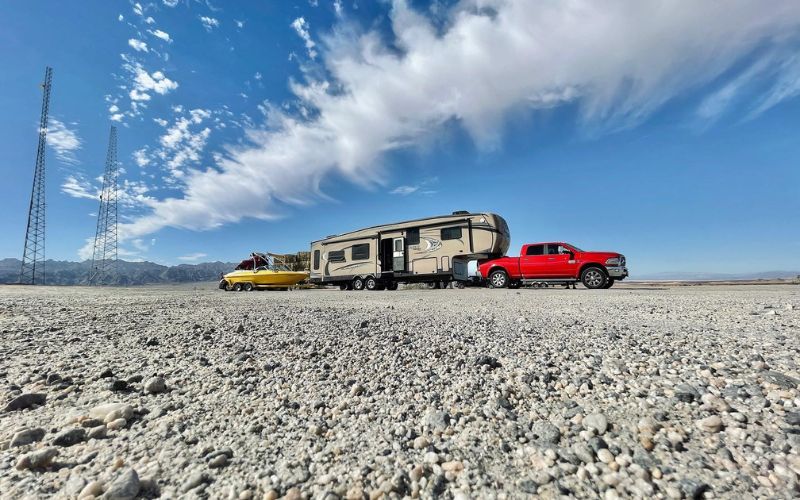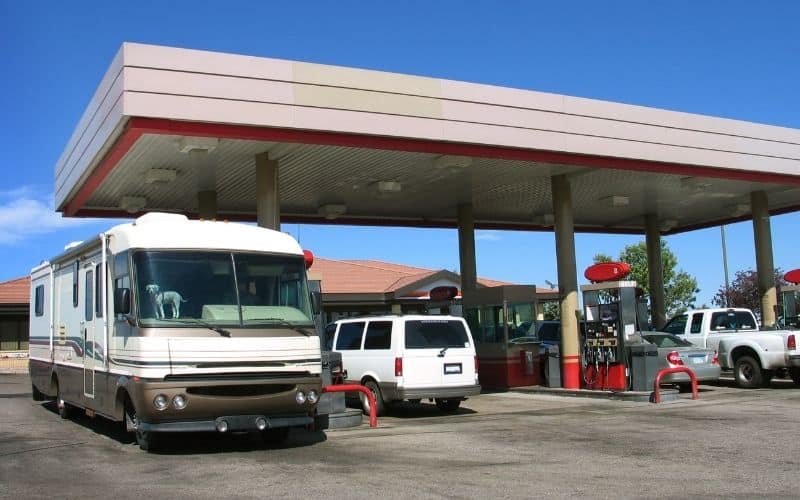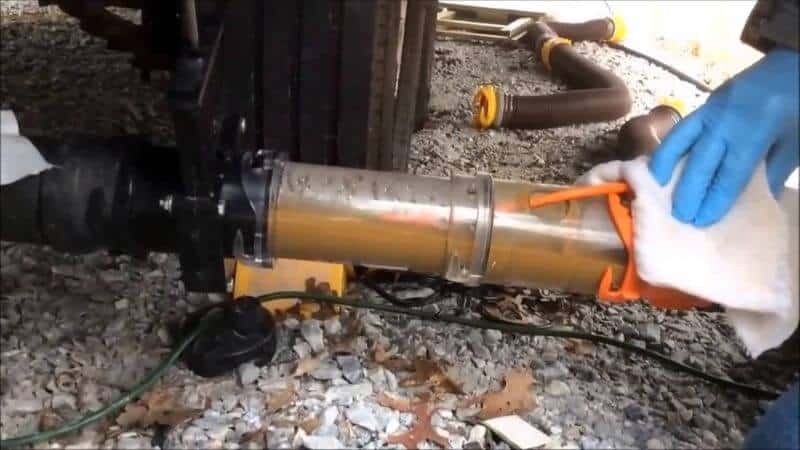One of the first questions you’ll have to cross off your list when when buying a motorhome, 5th wheel, travel trailer or camper is the condition of your next vehicle.
So, Is it better to buy an RV new or used? There are many strong opinions on this debate, which has been around as long as RV’s have.
With the insane number of options out there, It can be hard to tell whether or not a new RV is worth the extra money or if the risks of a used RV outweigh the savings.
Your personal situation is unique, and at the end of the day, you are the only one who can decide which option is best for you.
There are real pros and cons of each option. There’s no right answer to RVing, and what worked for others may not work for you. Understand key risk factors that impact both new and used RVs to decide what is right for you.
Here are 14 facets that will help you decide whether you should buy a used or new RV.
1: How Much Do You Want To Invest?
The key to any purchase is the bottom line; how much does it cost? You’ll have to define your budget and let that number narrow your field of options until you find the right RV to buy.
The lower price of a used RV is the most significant benefit of shopping for a used vehicle.
New RVs will obviously cost more money than a used RV with similar features. The guarantee that no one else has ever slept in the RV bed, used your bathroom’s throne, or spilled their wine on your couch, is worth a bit of extra money.
RVs, like any vehicle, start to depreciate the moment you drive them off the lot. That means buying an RV used for just two years will instantly save you a few thousands of dollars.
Depending on where you purchase your used RV from, you will be able to haggle even more.
If the previous owner is desperate to sell, you could come away with a slightly used RV with many more capabilities than a new one worth the same amount of money.
Advantage: Used
2: Expect The Unexpected Hidden Fees
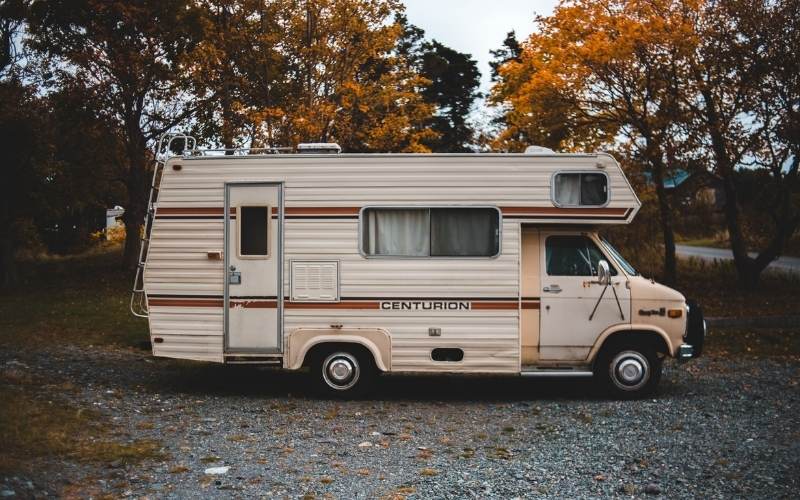
Hold on just one minute! There is more to price than meets the eye.
New RVs will come loaded with protections. They are most often purchased from a dealership whose business would fail if they were selling new RV’s that fall apart the moment people drove them off the lot.
To make people feel more secure in their investments, new RVs will feature warranties and money-back guarantees that will ensure you have a few years of use out of your vehicle without having to worry about paying exorbitant repair fees.
A second owner will forfeit any pre-existing warranty, and it is a rare sighting to find anyone offering a warranty on a used RV.
If you purchase a used motorhome or travel trailer from a private seller, and your A/C goes out two weeks later, you’ll be stuck footing the bill.
Anyone buying a used RV should expect a few hidden fees in the form of repair bills in the first year or two of ownership.
Advantage: New
3: Do You Want Financing Options?
New RV’s will often come with financing options that make it a bit easier to afford your new home on wheels.
RVs aren’t cheap, and if you want high-end technology in your RV, chances are you’ll have to plan out your payments.
Most people will subscribe to a payment plan and loan to help buy the RV of their dreams. However, dealerships don’t have the same desire when selling a used RV.
Used camper vans and RV’s that are in dealership lots are most often there as part of a trade-in deal for a new recreational vehicle.
This fact reduces the incentive of a dealership to sell the used RV. A finance plan is an investment in the vehicle by the dealer, and they won’t want to take on the additional risk of a used RV.
It’s incredibly uncommon to work out a financing arrangement in a private sale, which means if you don’t want to pay for your entire RV at once, you may have to look for a new one.
Advantage: New
4: Take A Look At The Vehicle History
No matter what vehicle you are purchasing, it’s essential to understand where every part has been.
RVs carry loads of extra pieces whose history is incredibly relevant to the vehicle’s value.
A new RV will come with all the paperwork and information that will allow you to trace each part back to the assembly line.
So, checking the history report for your travel trailer will help you feel safe knowing there are no aftermarket parts put on and make it easier to order replacements if something malfunctions.
The information available on your used motorhome, travel trailer or 5th wheel will all be at the hands of the previous owner.
They will have to inform you about any repairs or adjustments made to the vehicle, and there is no way to certify their information.
Shopping used adds on the extra risk of uncertainty regarding each part of the vehicle’s origin story.
Advantage: New
5: Deal Or No Deal
If you’re shopping for RV’s from a dealership, your salesperson is going to have a handful of deals they’ll throw at you to make your purchase easier.
Some new RV’s can be discounted by up to $20,000 if you can pay in cash, a sizeable down payment, or take an older but still new model.
While the price of a used RV will be lower than a new one, the value may be lower, too, as dealerships don’t care as much about selling used RV’s.
This also means they will be less likely to throw any deals your way to incentivize the purchase.
Once you set your budget, you can negotiate more with a dealer on a new RV to see if you can get the vehicle into your price range.
If you’re shopping for a used motorhome from a private seller, you should also look to negotiate on the price.
In the right scenario, you could find someone willing to cut you a great deal to get the vehicle off their hands and end up saving even more on your used RV purchase.
Advantage: 50/50
6: Who Do You Want to Buy Your RV From?
There’s a totem pole of RV sellers, with national dealership chains like Camping World at the top, and lowly Craiglist hagglers somewhere towards the bottom.
You have to consider what kind of post-purchase support you want from your RV, and use that to help determine where you are going to be shopping.
Buying a new RV from a large dealership will often come with years of helpful support. Your salesman has an incentive to continue your relationship through the life of your RV just in case you help your friends purchase an RV.
Used RV sales are often one-time transactions.
Once you drive away with your RV and have questions about how to fire up the propane system if you have purchased your used RV from craigslist there is no guarantee the old owner will answer your calls.
7: Premium RV, Premium Insurance
The bills don’t stop when you pay off your initial purchase.
As long as you plan on having your RV on the road, you’ll have to keep everything safe by selecting an insurance policy.
The more there is to protect, the more premium you’ll have to pay.
New RVs will have higher insurance costs. The more modern and upgraded the features are, the more it would cost to replace them.
Depending on what state you’re in, you could be looking at paying up to 5,000 dollars a year in your insurance coverage.
The more used your camper was when you first bought it, the less you can expect to pay in your insurance policy.
Advantage: Used
8: Do You Want To Make Renovations?
We all want to change a little something in our RV’s to make our mobile house a mobile home.
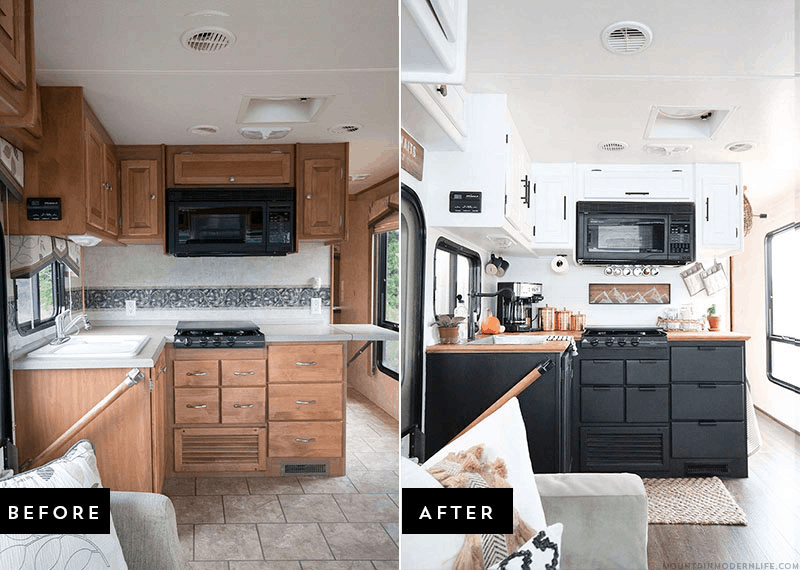
New RVs offer varying floorplans and customization options that allow you to build the RV of your choosing, but once the RV is in your possession, you shouldn’t expect to start tearing the RV apart.
Renovating a new RV could drastically reduce the value, as you’ll start to introduce aftermarket parts to the mix.
Used RVs can be looked at as somewhat of a blank canvas, depending on what you are purchasing.
If you’re good with your hands, you can even take on an older RV whose frame is still in good condition and drastically increase the vehicle’s value after a few months of hard work.
Advantage: Used
- New should be something you’re happy with when you drive it off the lot
- Old should be something you expect to make a few changes too
9: How Long Will You Own Your RV?
This factor could be hard to answer before you set out on your journey but is an essential factor between purchasing a new or used RV.
RVer’s just starting to get their feet wet with the lifestyle should consider shopping for a used one.
This will make it easier to sell in a few years if you want to upgrade or shift up your space without losing a hefty portion of your investment.
Folks who love to keep up with the times and get a new vehicle every few years should also look towards a used RV that will be easier to trade-in when the time comes.
If you want to commit to your RV and use it for the next decade or more, buying a new RV is the best way to ensure the vehicle lasts as long as your thirst for adventure.
Depreciation won’t be a huge concern, and the factory warranties and brand new parts will make for fewer trips to the repair shops over time.
Advantage: Short Term Used, Long Term New
10: Where Do You Plan On Sleeping?
Where you want to sleep in your RV will significantly impact what you should be shopping for.
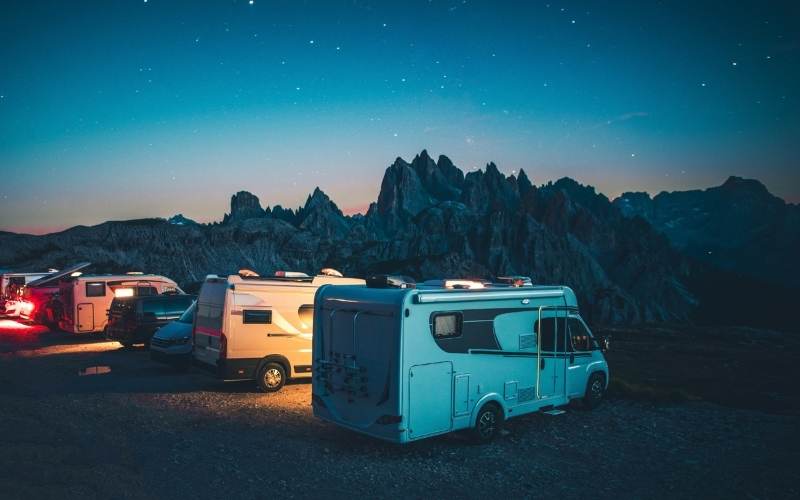
Large RV parks and campgrounds can sometimes have regulations about which types of RVs can park on their property.
Upscale locations may not allow any RV older than ten years on the grounds.
If you plan to use your RV to socialize and find RV communities, new RV’s will be welcome in every neighborhood.
That doesn’t mean it’s a guarantee that you can go to fewer places with a used RV.
The extra features you can find in a used model for the same price may be the difference in your RV being able to support a boondocking adventure, and a large majority of campgrounds open their doors to everyone.
Advantage: Slightly New
11: Do You Know Exactly What You Want
There are RVs of all shapes and sizes on the market. When making a purchase this big, it could be a smart choice to pay a few extra dollars to ensure you have exactly what you want out of your mobile home.
New RVs are cataloged in full, and even if they don’t have exactly what you are looking for at your local dealership, chances are they can get the model with the floorplan of your dreams shipped right to your doorstep.
Buyers shopping for used RVs will have more limited options. It’s not always easy to find exactly what you had in mind when scrolling through a resale market.
You’ll have to prepare to be adjustable and to compromise on a few things if you want a used RV.
Advantage: New
12: Prepare An In-Depth Pre-Purchase Inspection
If you don’t know your way around RV’s at all, it may be an overwhelming proposition to inspect a used RV before purchase properly.
You can always take it somewhere to get looked at, but how confident can you feel to trust someone else’s opinion about such a significant purchase?
Folks purchasing Used RVs will have to check every inch of their vehicle for water damage, functioning accessories, and rust. That doesn’t even include all the engine inspection work.
Make sure you comb through the seals, kitchen appliances, air conditioning unit, and all power sources/fans on both battery and shore power.
Most agreements won’t protect a used purchase in the same way, and without a proper pre-purchase inspection, all you’ll have to rely on is the seller’s word.
New RVs will just have to look out for lot rot. This is a phenomenon caused by an RV sitting on display at a lot without having much use.
It most commonly affects the coach battery, as no one is often maintaining the battery’s health.
Advantage: New
13: How Much Work Do You Want To Put In?
When when buying a motorhome, 5th wheel, travel trailer or camper, it’s a good idea to be wary of a heavily discounted price.
Generally, the lower the initial price you’ll pay for an RV, the more hours or dollars you should expect to put in in repairs. There’s no such thing as a free lunch, and there’s certainly no such thing as a free RV.
You shouldn’t expect to have to make any changes to a new RV.
If there are some small kinks to be sorted out from lot rot, you can work with your dealer on those issues, and after that, you can expect years before things start to fall apart.
A used RV will practically never come fully ready to roll. Any used RV sale will be accompanied by some detailed repairs and fine-tuning parts to get things ready to go.
Nobody is selling their RV because they use it every weekend and everything worked perfectly.
Most often, RV’s listed for trade have sat in driveways for months, or have problems the current owners don’t feel like fixing.
However, if you fancy yourself a handyman, you may find a great deal accompanied by enough elbow grease.
Advantage: New
14: Depreciation Affects Every RV
Your RV should never be looked at as a financial investment.
Your RV is all about making memories on the road and seeing new places.
However, the worth of their vehicle has to be in the back of every owner’s mind.
A new RV will seldom be worth more than what you pay for it. If you are thinking about buying an RV with the intent to sell it eventually and make your money back, the only way to pull that off is to look for a used RV.
Used RV’s more than five years old have already seen a large percentage of their depreciation, and if you’re a capable carpenter, you can fix up a lemon and flip your RV for a profit.
Advantage: Used
Who Might Feel At Home in A Used RV?
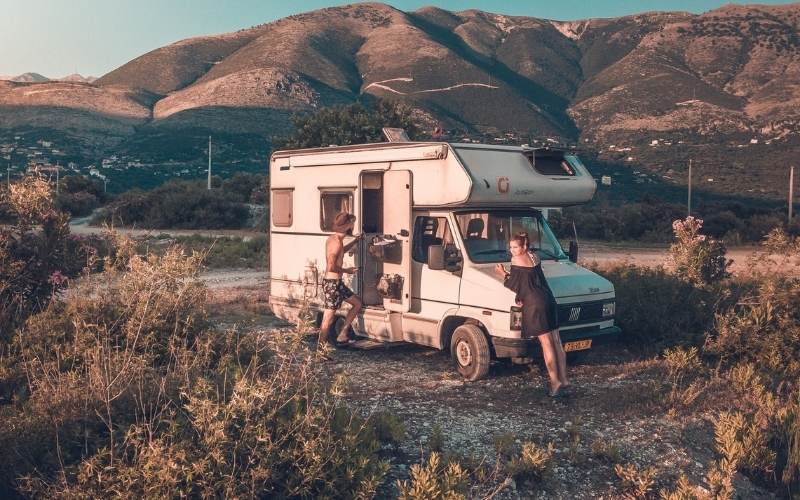
Buying a used RV that’s still in good condition is perfect for folks who want to experience the freedom of the road but don’t want to invest their life savings to get out there.
People who don’t care much about where their RV has been before it was in their hands can find RV’s with similar features to new models at a fraction of the cost.
Those with lower living standards can also rest easy with a used RV, as long as they don’t need top-of-the-line products lining up the interior.
Someone who just wants a bed to sleep on while they’re out in the woods does not need to shop around for a new RV.
Suppose you don’t see yourself with a high list of demands for your camper or are even passionate about finding fixer-uppers and making them whole.
In that case, you will probably prefer the quality and price point of a used RV.
When does buying a New RV make sense?
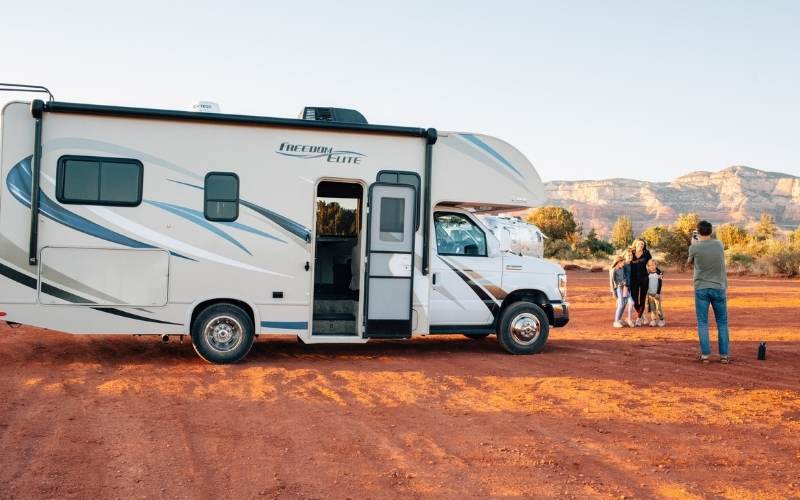
More Financially able shoppers who are confident that their RV will be a significant part of their lives for years to come will love the comfort, guarantee, and perks a new RV brings to the table.
Those of us looking to travel with children won’t want to leave much up to chance, and the extra safety and security features of a new RV work well with a familial lifestyle.
If your RV is something you want to keep in the driveway and drive on the highway for decades, the longevity offered in a new RV is worth the extra investment.
Is It Better To Buy A Used RV Compared To A New RV?
Sort through the factors listed in this article and find the ones that are most important to you.
Chances are, there are a few details that are extra important to your personal choice that will change up how you go about making your decision.
Feel out where you fit in each category and see with which style of vehicle the advantage lies.
There are a few additional questions you’ll have to ask yourself alongside this research. Mainly, what is your price range? And what is most important to me? When you envision yourself inside an RV for the weekend, what does that look like?
It’s going to take time, debate, and research before you can choose whether you want a new or used recreational vehicle. Both new and used RVs have significant upsides and downsides that make one choice work better on a personal basis.
The critical thing to remember is that no matter which style you choose, you will be on your way to adventure whenever you feel like shifting your vehicle into drive.
There are fantastic used and new RVs on the market, and any style of RV is a worthy companion for getting out there and exploring more.
Once you’ve made your choice, commit and get your journey started.

